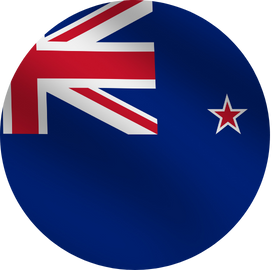




MBBS in New Zealand
In the serene landscapes of New Zealand, two esteemed universities offer premier MBBS degrees. These six-year programs, available at top-notch medical colleges, boast cutting-edge technology and exceptional infrastructure. Both universities are ranked among the top medical colleges in the 2023 QS Rankings. While each university hosts two medical colleges, only the University of Otago’s medical college is approved by the Medical Council of India (MCI).
Prospective students must have completed class 12 with science subjects, including Biology. For international students, the average cost of studying this program at New Zealand universities ranges from 70,000 to 80,000 NZD (approximately 3.7 to 4.2 Lakh INR). Upon completion of an MBBS degree in New Zealand, graduates can expect to earn around 150,000 to 160,000 NZD per year.
Benefits of Studying in New Zealand?



Globally Recognized Qualifications
New Zealand registers 1500+ new doctors yearly. University of Auckland grads, MCI-approved, can practice in both countries.
Quality Assurance
NZQA ensures top-quality education at universities. State sponsorship of both MBBS-offering universities highlights their commitment to excellence.
Lucrative Opportunities
NZ doctors earn 150,000 NZD (~79 Lakh INR) on average, far more than in India post-MBBS, making it a top destination for medical professionals.
High Demand for Medical Practitioners
40% of NZ doctors are international, indicating high demand. Shortage of doctors creates opportunities for international graduates.

MBBS in New Zealand Advice for Indian Students
Indian students considering MBBS in New Zealand, it’s essential to research thoroughly and understand the admission requirements and processes of the universities offering MBBS programs. Ensure that you meet the eligibility criteria, including academic qualifications and language proficiency. Finally, embrace the opportunity to contribute to the diverse medical workforce in New Zealand, where nearly 40% of doctors are international, reflecting the high demand for overseas medical practitioners.`

| Requirements | University of Auckland MBBS | University of Otago MBBS |
|---|---|---|
| Entry Requirements | Applicants must complete 8 core courses under BHSc or BSc Biomedical Science on a full-time basis in the year of application for MBBS. | Applicants must qualify for the Health Sciences First Year Course, which includes a specific set of courses. To progress to MBBS, students must achieve a score of 70% in each of these courses on their first attempt. |
| ELP Scores | - | IELTS: 6.0 / TOEFL iBT: 80 / TOEFL PBT: 550 / PTE: 58 |
| Entrances Accepted | UCAT ANZ | UCAT ANZ |
| Selection Criteria | GPA for 4 core courses: 60% UCAT ANZ Final Score: 15% Interview: 25% | GPA & UCAT ANZ |
| Application Dates | December 1, 2021 | August 1, 2021 |
UCAT ANZ Test: The UCAT ANZ Test is jointly conducted by Australian and New Zealand universities for admission into medical programs. It comprises five sections: Verbal Reasoning, Decision Making, Quantitative Reasoning, Abstract Reasoning, and Situational Judgement. The test is computer-based and administered in Australia, New Zealand, and select overseas locations. Applicants must pass all five sections to be considered.
The average cost of living for students in New Zealand is approximately 14,000 to 16,000 NZD per year, covering accommodation, food, transportation, and other necessities. Many colleges offer twin-sharing hall of residence accommodation, which is the most affordable option as it is provided by the college.
Additionally, students have other accommodation options such as furnished flats in private hostels affiliated with the college or homestays with local families. Public transportation is inexpensive, with metro ticket rates typically ranging from 1.25 to 2.00 NZD.
Pre Arrival Cost
These expenses are required to be paid before getting enrolled in the university. An average cost is tabulated below:
| Type of expense | Cost (in NZD) |
|---|---|
| New Zealand student visa | 330 |
| IELTS fee | 420 |
| TOEFL fee | 410 |
| Airfare | 450-700 |
Tuition Fees for MBBS in New Zealand:
The tuition fees for the University of Auckland and University of Otago are 77,000 NZD and 35,000 NZD, respectively. For Indian students, this translates to approximately 40 Lakhs INR and 18 Lakhs INR, respectively. In comparison, the cost of pursuing MBBS in India ranges from 4 to 15 Lakhs INR per year. Opting for MBBS at the University of Otago not only offers a similar cost to studying in India but also provides additional cultural exposure from studying abroad.
Cost of Living in New Zealand:
The cost of living in New Zealand falls between expensive and cheap. Housing and food expenses typically consume the largest portion of the budget. However, scholarships can significantly alleviate monthly expenses, with many covering a substantial portion of living costs. Additionally, the New Zealand government offers various education loan schemes, although residency status is typically required to apply. These loans can be easily repaid after completing the degree. The main expenses are detailed in the table below:
| Type of expense | Monthly Cost (in NZD) |
|---|---|
| Hostel | 1000-1500 |
| Homestay | 1500-2000 |
| Food | 480-550 |
| Traveling | 100 |
After completing MBBS, individuals can pursue surgery, although there may be restrictions on performing solo surgeries initially. Due to limited experience, students are often allowed to participate in group surgeries. With a shortage of doctors in the country, the demand for medical professionals is high.
Following graduation, doctors in New Zealand can expect to earn an average annual income ranging from 100,000 to 250,000 NZD. The state-of-the-art medical technology in New Zealand offers lucrative opportunities for medical professionals to earn handsome salaries.
Qualified candidates employed by the District Health Board typically receive annual salaries between 150,000 and 200,000 NZD. Physicians working in the private sector may earn even more, with salaries typically exceeding 20,000 NZD compared to public sector counterparts. Some common job opportunities in New Zealand after MBBS include:
| Job Roles | Job Description | Average Annual Salary (NZD) |
|---|---|---|
| Medical Practitioner and Surgeon | Dealing with group surgeries and medicine | 145,000 |
| General physician | Dealing with multiple diseases, without involving surgery | 136,500 |
| Psychiatrist | Dealing with mental health and psychological disorders | 200,500 |
| Ophthalmologist | Deals with eye disease and surgery | 126,500 |
MBBS in New Zealand spans six years, after which graduates can commence practice in the country, yielding a substantial income. Currently, approximately 30,000 international students are enrolled in MBBS and related undergraduate programs across New Zealand universities. The MBBS degree from New Zealand holds global recognition and carries significant value. Graduates find it advantageous when pursuing master's degrees within the country, as universities often prioritize candidates who have completed their undergraduate studies in New Zealand.
Scholarships for international students in New Zealand are offered by universities, covering not only tuition fees but also travel and accommodation expenses. The eligibility criteria and amounts for these scholarships are outlined in the table below:
| Scholarship | Eligibility | Stipend Per Annum (IN NZD) |
|---|---|---|
| New Zealand Excellence Award | Must be an Indian citizen; Minimum GPA should be B+ in the highest qualification | 18,000 |
| University of Auckland International Student Excellence Scholarship | Must be new, full fee-paying international student; Must be enrolled as ‘on campus’. | 10,000 |
| Generation Study Abroad Excellence and Travel Awards(only for US student) | Must be a US citizen; Minimum GPA-3.0 | 3,458 - travel award; 865 - excellence award |
| TWJ Johnson Scholarship in Clinical Medicine | Successfully completed part 3 of the MBChB degree at the University of Auckland; Required GPA - 7.0 | 6000 |
| University of Auckland MBChB Graduate Entry-International student scholarship | Pursuing MBChB; Admission through international graduate entry category | Up to 70,000 |
To apply for MBBS in New Zealand, students must have a minimum score of 75% in the 12th standard. However, admission requirements may vary depending on the medical college. The following sections provide detailed information on the specific admission criteria for studying in New Zealand.
- Academic transcripts from previously attended institutes, demonstrating completion of higher secondary education (10+2) with a minimum score of 65% overall.
- Clearance of the NEET examination prior to applying.
- Standardized English language proficiency test scores (PTE, TOEFL, or IELTS) for international students.
- A bachelor’s degree in any field of science.
- 2-3 Letters of Recommendation (LORs) or reference letters from professional references or previous academic professors.
- A Statement of Purpose (SOP) outlining the applicant's intent to pursue a specific course.
- An updated resume.
- A valid student visa for New Zealand upon receiving the letter of acceptance from the chosen college.
- Proof of funds for financial support.
- Clearance of the UCAT, a compulsory entrance examination for MBBS courses in New Zealand.
- Documents related to financial aid or student loans, if applicable.
- Any additional relevant certificates.
Top Universities
Learn from top-class universities abroad with expert assistance from Santamonica.
We help you get admitted to the best universities!








Answers to Common Questions about MBBS in New Zealand
What is the structure of the MBBS program in New Zealand?
The MBBS program typically spans six years and is divided into pre-clinical and clinical phases. Pre-clinical years focus on foundational sciences, while clinical years involve practical training in hospitals and healthcare facilities.
Are there any language proficiency requirements for international students?
Yes, international students are usually required to demonstrate proficiency in English by providing scores from tests like IELTS or TOEFL.
What are the entry requirements for MBBS programs in New Zealand?
Entry requirements may vary among universities but generally include academic qualifications, such as completion of secondary education with specific subjects like biology and chemistry, as well as meeting minimum grade point averages. Some universities may also require interviews or admissions tests.
Are there any scholarships available for international students?
Yes, there are scholarships available for international students in New Zealand, but availability and eligibility criteria may vary. Prospective students are encouraged to explore scholarship options offered by universities, government agencies, and private organizations.
Can international students work while studying MBBS in New Zealand?
International students in New Zealand are typically allowed to work part-time during the academic year and full-time during scheduled breaks. However, there may be restrictions depending on visa conditions, so it's essential to check with immigration authorities for the latest regulations.

